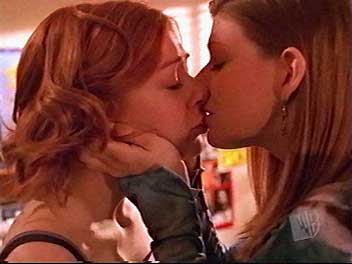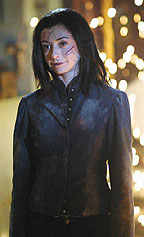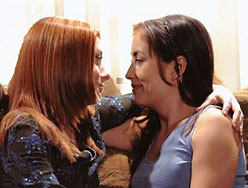

The "Buffy, the Vampire Slayer" page


|
This page has no affiliation with WB
or Buffy the Vampire Slayer. All information provided here is meant to
be informational, but not necessarily the intent of the producers. The
content of this page is protected under the fair use clause.
|
| last updated 8/6/03 |
Overview
Buffy, the Vampire Slayer has become quite a cultural phenomena. Originally
released as a poorly received movie in 1992, it became a weekly TV series
from 1997 to 2003 (first aired on WB and then moved to UPN). During it's run,
it spawned a spin-off entitled Angel. The show appropached
the genre of queer horror very slowly, but after it did, it blew the hinges
off the coffin!
Seasons 1-3: Gay Mortals and Bisexual Vampires
The premise of Buffy was exploring good/evil and growing up. At the start,
Buffy was a lot like any other TV show - perky teenage models go to high
school and suffer it's trials and tribulations - except it had a slayer,
lots of vampires, and well... many evil beasties. The characters were
likeable, off-beat and definitely outsiders, but everyone was happily
heterosexual. And so it continued through out the first season.
 But,
by the end of the second season, it began breaking the mold. In
'Phases' we are introduced to Larry, the
star high-school football player, and your typical straight jock jerk.
Larry seemed to be the most likely person behind Sunnydale's (the
fictional town that the show is set in) latest caper - werewolf attacks.
Xander, one of the main characters - or 'Scooby-gang', knows
that Larry has to be the werewolf and goes to confront him. However, in a nice
comedy of errors, Xander accidentally discovers that Larry is really gay. Larry
decides to come out of the closet having the courage to do so because of how
comfortable Xander is being gay. Xander is so caught off-guard by this admission,
that he doesn't know how to mention that he's straight. By the end of the episode,
we see a different Larry, one that is a bit kinder and more sensitive.
But,
by the end of the second season, it began breaking the mold. In
'Phases' we are introduced to Larry, the
star high-school football player, and your typical straight jock jerk.
Larry seemed to be the most likely person behind Sunnydale's (the
fictional town that the show is set in) latest caper - werewolf attacks.
Xander, one of the main characters - or 'Scooby-gang', knows
that Larry has to be the werewolf and goes to confront him. However, in a nice
comedy of errors, Xander accidentally discovers that Larry is really gay. Larry
decides to come out of the closet having the courage to do so because of how
comfortable Xander is being gay. Xander is so caught off-guard by this admission,
that he doesn't know how to mention that he's straight. By the end of the episode,
we see a different Larry, one that is a bit kinder and more sensitive.
Larry appears a couple of more times, and always in a positive light. However, the gay aspect of the show takes a different angle when Buffy has to come out of the closet to her mother as being a slayer. You see, Buffy had been living a hidden life that she only shared with a few close friends. She knew she was different and knew it wasn't a choice, but had to become comfortable and accept the fact that she was a slayer. While this parallels what many gay teens have to go through, Joss Whedon, the creator of this show, doesn't leave the parallel as inferred and goes a step beyond by including a number of coming out cliché's in a number of episodes. Not only was the above explanation given, but Joyce, Buffy's mom also uses phrases such as "have you tried not being a slayer" and "why did you choose to be this way". This parallel is continued in "Dead Man's Party" in season three. Here, Joyce even asks if she is expected to march in a 'Slayer pride parade'.
|
In "Dopplegangland", vampire Willow is brought to the Buffyverse, where 'good' Willow already resides. It becomes very apparent that she is quite unconcerned with gender, and may even prefer women, when showing her vampiric desires. At one point she runs her tongue up and down the neck of a woman before she 'drains' her. To confuse matters even more, vampire Willow captures the human Willow and begins to lick her neck before stating what a great pair the two of them would make. She further shows her desire for herself by grabbing her human counter-part's rear end at the 'tail' of the episode.
|
|
One thing that makes this episode so wonderful is how it laid the ground work for a major coming out later in the series life span. Noticing where the vampire's interests seem to lay, human Willow describes the vampire to her friends "So that's me as a vampire. I'm all evil ... and skanky ... and I think I'm kind of GAY!" Buffy, reacting as though this is a bad thing tries to assure Willow that the vampire desires have nothing to do with Willow's own. As she says this, Angel interrupts and begins to say something and then changes his mind. But we are left wondering if the vampire was only a perversion of the character's natural traits. But if that's the case, what does this say about Willow, the shy, nerdy computer geek who's big life change is to start dating a male drummer in a band. Granted in Sunnydale things are not quite that simple, as he is also a werewolf. |
Seasons 4-5: Lesbian Witches and Transgender Demons
While Buffy was not the first show to have a character come out of the closet,
it is the first teen drama series to have a main character do so. Willow
begins to develop an interest in witchcraft and discovers that she's rather
good at it. As the Scooby gang goes off to college, Willow decides to explore
her interest by joining a Wicca group. She is already able to do simple spells,
float pencils and generally cause magical mayhem.
But in "Hush", one of the best episodes of Buffy created, she discovers that the Wicca group is one that fits much better into this one than the darker and more mystical Buffy-verse. Being more concerned with harmonizing with the Earth Mother and scented candles than in performing any dark rituals, the group chastises Willow for promoting stereotypes when she suggests that they do spells. Only one other woman appears to be interested in what Willow tries to suggest, and this is our first introduction to the shy Tara.Over the course of this episode, Willow and Tara meet and discover the magickal power that they have together. In this episode, we see the briefest of glimpses into what will occur.
 What
occurs is a relationship that opens up between Willow and Tara. The relationship
is very slow in the making, and is easy to shrug off as being a friendship for
quite a while. Frighteningly, the first person to notice the growing relationship
was Faith, a vampire slayer that turned to evil, in the episode "Who Are
You". As is appropriate for the Buffyverse, Faith has taken over the body
of Buffy, and in this body, meets Tara. Recognizing the looks and body language
of the two, Faith-in-Buffy remarks that "Willow's not driving stick anymore."
What
occurs is a relationship that opens up between Willow and Tara. The relationship
is very slow in the making, and is easy to shrug off as being a friendship for
quite a while. Frighteningly, the first person to notice the growing relationship
was Faith, a vampire slayer that turned to evil, in the episode "Who Are
You". As is appropriate for the Buffyverse, Faith has taken over the body
of Buffy, and in this body, meets Tara. Recognizing the looks and body language
of the two, Faith-in-Buffy remarks that "Willow's not driving stick anymore."
The pivotal episode in Willow's coming out process occurs in "New Moon Rising." Oz, the aformentioned boyfriend of Willow who left town after discovering that he couldn't control the werewolf within him (notthe commonest of problems, but one with which many people can relate), returns. Very strange and tense moments occurs when Tara tries to give space to Oz so that he and Willow can spend time together. However, about halfway through the episode, it changed from an episode that fans would spend years arguing 'no she's really straight' / 'no this proves she's queer' to a very overt and gay-positive episode. Oz smells Willow behind him and turns around to find Tara. Tara's clothes reek of Willow and Oz figures out that the two are not just friends. Obviously not pleaseed, he warns Tara to run as he feels the wolf take control of his body again.
Meanwhile, Willow is trying to explain to Buffy why it is really inopportune that Oz show up now. Buffy doesn't understand so Willow begins talking about Tara and her interest. Buffy at first is wide eyed when she thinks Tara is interested in Oz, and later almost dumb-founded when she realized that Willow and Tara are interested in each other. Buffy and Willow then have to have a very sensitive talk about how Willow's coming out affects their friendship and how it doesn't. A talk that most of us who have come out have had to have with our friends. By the end, Willow has to choose who she will continue to be with, and she chooses Tara.
 Willow
and Tara's relationship blossoms, and more importantly - continues, throughout
the season (and the next). We get to watch the relationship blossom in a way
that only two lesbian witches can muster, by watching their magic develop.
Willow
and Tara's relationship blossoms, and more importantly - continues, throughout
the season (and the next). We get to watch the relationship blossom in a way
that only two lesbian witches can muster, by watching their magic develop.
Over the course of the season, Willow comes out to the rest of the Scooby gang, and she and Tara are referred to as a couple. However, it is not until "The Body", the most powerful Buffy episode created, that we see Willow and Tara kiss. Trust me when I say that the emotions this episode invoke are so powerful that not even Jesse Helms could have mustered indignation at the kiss. The kiss was provided as a means to show how much they care about each other and how they are there for each other in times of crises, rather than as a sexual indication. It provides a brief moment of comfort for even the most heavy-hearted during this emotional episode.
The characters get through this episode, but things only seem to go from bad to worse. As the end of this season nears, Tara's mind is taken from her and we learn that Willow is willing to give up almost anything for her. By the end of the season, the two of them are re-united as a couple, even as horrible devastation greets them.
 Interestingly,
the way Tara lost her mind is that a god took it from her. Willow realizes
that the only way to get her girlfriend's mind back is to fight this god.The
god is Glory, or more formally, Glorificus. Granted, she is a somewhat deposed
god that doesn't appear to have huge powers, but those she still has apparently
are much more than any those posessed by the other evils that Buffy has fought.
A stunning woman who is rather vain about her appearance, it's unclear to us
at first that she is really transgendered.
Interestingly,
the way Tara lost her mind is that a god took it from her. Willow realizes
that the only way to get her girlfriend's mind back is to fight this god.The
god is Glory, or more formally, Glorificus. Granted, she is a somewhat deposed
god that doesn't appear to have huge powers, but those she still has apparently
are much more than any those posessed by the other evils that Buffy has fought.
A stunning woman who is rather vain about her appearance, it's unclear to us
at first that she is really transgendered.
 However,
in "Blood Ties", we learn that the gentle intern,
Ben, seems to share a body with this big bad god.
However,
in "Blood Ties", we learn that the gentle intern,
Ben, seems to share a body with this big bad god.
Over the course of Season 5, the walls that separate Glory and Ben come tumbling down and the two of them become more and more aware of each other and the fact that they have to work together as a team to gain separate bodies. At the end of Season 5, Buffy must battle Glory/Ben who are now working together as a team, and shifting back and forth between their respective appearances frequently.
The finale of Season 5 is considered by many Buffy afficionados to be the 'real end' of Buffy -the series, as it coinsided with the end of Buffy -the character. Buffy had to sacrific her own life in order to save the world. Powerful and poignant, it was a touching way to end the show. But as mentioned earlier, nothing in the Buffy-verse is final. While Buffy continued for 2 more years, the episodes lacked the direction and power that the previous episodes had. If we view this as the end of Buffy, then we see something rare in queer horror - the survival of queer character by the end. Though the Buffy-verse ends (in a sense), Willow and Tara are still greatly in love.
Seasons 6-7: Evil Lesbians and Queer Slayers
Willow and Tara begin to part ways as
 Tara
realizes that Willow has been using magic on her in order to make her forget
when she's mad at Willow. During 'Once More With Feeling' a unique 'musical'
episode where all secrets of the characters are revealed in song, the point
of no return is reached. The episode is wonderful and truly unique in that
it contains the only lesbian-witch-orgasm song you're even likely to hear entitled I'm
Under Your Spell (1.4M).
Tara
realizes that Willow has been using magic on her in order to make her forget
when she's mad at Willow. During 'Once More With Feeling' a unique 'musical'
episode where all secrets of the characters are revealed in song, the point
of no return is reached. The episode is wonderful and truly unique in that
it contains the only lesbian-witch-orgasm song you're even likely to hear entitled I'm
Under Your Spell (1.4M).
As this song shows, Tara and Willow are madly in love until Tara learns that Willow has been altering her memory. At this point Tara realizes that she can no longer stay with Willow because Willow violated her trust and has developed a 'magic habit'. She forgives Willow against her better judgement and tells Willow she will only stay with her if Willow stays completely magic free. Willow again tries to modify Tara's memory in the next episode 'Tabula Rasa', and Tara then leaves her.
The two try to remain friends and Willow hits rock bottom (after visiting the magic pusher) and begins to climb back out - complete with night sweats. After seeing that Willow has really changed, Tara admits that trust will take a long time to win back and then asks Willow if they can skip all that and get back together.
 Sadly, as was the nature with this season, happiness is only temporary. Shortly
after getting back together, the unspeakable happens and Tara is accidentally
killed by Warren, one of three geeks attempting to be 'the big bad'. The
loss of Tara pushes Willow over
the edge and she decends deeper into the dark side of magic than she ever had
been before. This descention pegs her as the new 'big bad' that the gang must
contend with as she decides that there is too much pain in the world and that
the only way to free people from the pain is by killing them all.
Sadly, as was the nature with this season, happiness is only temporary. Shortly
after getting back together, the unspeakable happens and Tara is accidentally
killed by Warren, one of three geeks attempting to be 'the big bad'. The
loss of Tara pushes Willow over
the edge and she decends deeper into the dark side of magic than she ever had
been before. This descention pegs her as the new 'big bad' that the gang must
contend with as she decides that there is too much pain in the world and that
the only way to free people from the pain is by killing them all.
As with most of Buffy's super-villains, she gets close to destroying the world. Buffy has finally met her match and is unable to stop Willow. However, Xander, the mild mannered side-kick in the group (and the only 'normal' person in it) is the one that saves the day. He reminds Willow that in destroying the world, she will also destroy him, and that he loves her as his best friend and so ends Season 6. A criticism of the way this season ended ran with respect to Willow and Tara is that it resored to a stereotype of lesbians found in a large number of horror items - lesbians either die or are evil. In this case, both occurred.
Season 7 is even less organizes and involves the gang fighting the source
of all evil. Willow is recovering from her magical addiction and finds that
magic is a part of her and that she must use it to help protect her friends.
Without Tara she feels empty and alone. Luckily this episode shows has many
young nubile slayer-ettes, girls who have the potential of becoming the slayer,
but won't be called until the current slayer is killed.
 One
of the slayers is an aggressive young woman named Kennedy. We get clues that
Kennedy is a 'girl's girl' fairly quickly, and that she has a bit of a thing
for repentant Willow.
One
of the slayers is an aggressive young woman named Kennedy. We get clues that
Kennedy is a 'girl's girl' fairly quickly, and that she has a bit of a thing
for repentant Willow.
Willow is still grieving over Tara and is slow to accept Kennedy's advances. But like most teen shows, she seems to get over it and accepts Kennedy rather quickly. We don't ever get to know much about Kennedy and it feels like they just introduced another character to keep the lesbian interest in the show.
Sadly, the end of Season 7 is fairly nonsensical and unimportant. The only item of interest is that Kennedy (and all the other slayer-ettes and many other women around the world) wake up to their full potential as slayers. But, Willow and Kennedy do both live through the end and, as we're lead to believe, live happily ever after.

